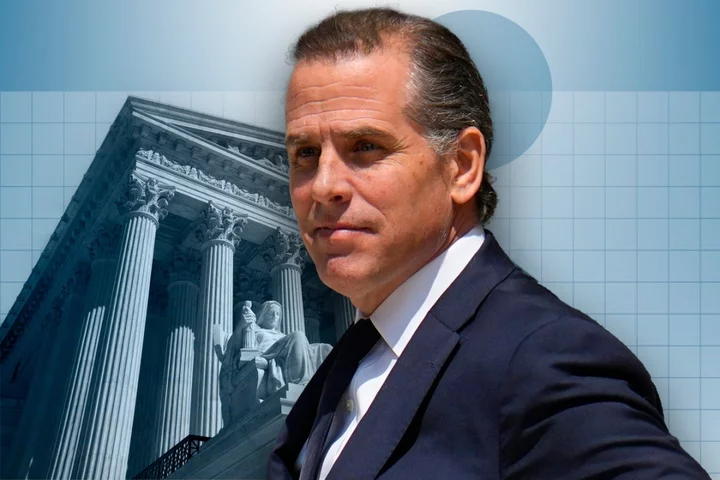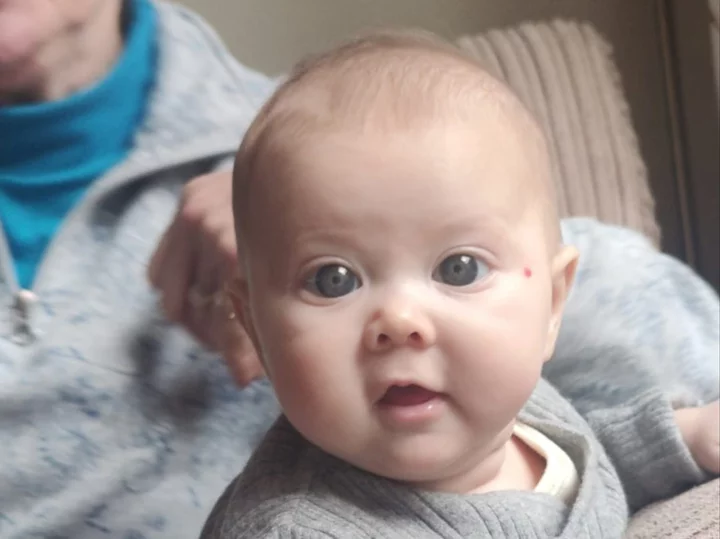
Marilyn Manson fined for blowing nose on concert photographer
The singer will perform 20 hours of community service and pay $1,400 in fines for the "egregious" act.
2023-09-19 05:56

Jury rejects lawsuit after police fatally shoot man when going to wrong house
A federal court jury in Oxford, Mississippi, has ruled against a civil lawsuit filed by the widow of a man who was shot dead in 2017 by two police officers, while serving a warrant at the wrong address. Claudia Linares was seeking $20m in compensation for the death of her husband Ismael Lopez, 41. During the four-day trial that concluded on Thursday 15 September, the jury ruled that Southaven officers, Zachary Durden and Samuel Maze, did not violate Lopez’s civil rights. “The verdict was that the jurors did not believe that the use of force used by Officers Durden and Maze was excessive in light of all the facts that they considered,” Murray Wells, the attorney for Lopez’s family, said in a statement to WREG-TV. The case had previously attracted attention because the city tried to argue that Lopez did not have any civil rights as he was living illegally in the US and was facing deportation and criminal charges for the illegal possession of firearms. However, in 2020, a judge rejected the city’s claim, and ruled that constitutional rights apply to “all persons.” The Mississippi Bureau of Investigation reported that on 14 July 2017, Lopez and his wife were in bed when officers knocked on their door with the intention of serving a domestic violence warrant to a person who actually lived across the street. According to Mr Durden and Mr Maze, the pair did not identify themselves, and when the door opened, Lopez’s dog ran out and he pointed a rifle through the door. Officer Maze then shot the dog and Mr Durden fired multiple bullets at Lopez. He died after a bullet hit the back of his skull when he was six feet from his front door. Police have claimed he was running away from law enforcement, and a third office later told investigators that Mr Durden had ordered Lopez to drop his rifle several times before shooting him. Lopez’s lawyers stated in their argument that his fingerprints and DNA were not found on the rifle supposedly used to fire at Mr Durden, but believe the officer shot him in reaction to his colleague shooting the dog. They also called upon evidence that state investigators found his body lying in a prone position with his hands cuffed behind his back. There is no video footage to corroborate either claim. “Those officers used tactical maneuvers to hide themselves as police officers,” Mr Wells told WREG. “There are a couple of huge factors at play. One was this unbelievable mistake of going to the wrong address and we felt it was just incompetent because they didn’t even take the time to look at the boxes. They went to the wrong side of the road, so that started this. They never announced that they were police and at the end of the day Ismael Lopez was shot through a door, in the back of the head,” he said. Darren Musselwhite, mayor of Southhaven, praised the jury’s decision: “This verdict proves what we’ve believed to be correct since day one as our officers responded appropriately considering the circumstance of being threatened with deadly force,” he said. “We’ve stood behind them during the last six years for this very reason and, for their sake, are glad this trial is over.” Read More Police officer who fatally shot motorist charged with murder Philadelphia officer to be fired over shooting death of Black man as new video contradicts police account A Utah man was killed during a police traffic stop. His family say they’ve been ‘stonewalled’ by authorities
2023-09-19 02:55

Biden takes a political hit but brings Americans home
President Joe Biden's deal with Iran that unlocks $6 billion in Tehran's frozen funds to bring five imprisoned Americans home is creating the kind of terrible optics and an opening for his domestic foes that a politically weakened president can ill afford.
2023-09-19 02:51

‘Very rich, very famous, and very powerful’: How Bernard Tapie became France’s first tycoon – and wound up in prison
If you’ve grown up in France, Bernard Tapie is one of those people you’ve always been aware of, without being able to remember when you first heard about them, or what they’re currently famous for. In Tapie’s case, the answer varied throughout the years: at times, he was famous for his career as a businessman; at others, for his career in the world of sports. There was also politics, show business, and legal scandals, depending on when you asked. Only one constant remained: from his rise to fame in the 1980s to his death in 2021, Tapie was notorious. A new Netflix series dramatizes 30 years of his life, charting his humble beginnings, his not-so-humble early successes, and the biggest legal controversy of his life—for fixing a soccer game in favour of Olympique de Marseille, Marseille’s soccer team, which he then owned. In France, the show is simply called Tapie—a name known to virtually anyone. In the US, it’s titled Class Act, an apparent wordplay to nod both to Tapie’s exceptional destiny and to his status as what sociologist Pierre Bourdieu called a “transfuge de classe”—someone who moves from one social milieu to another. The show, comprising seven episodes, is a fascinating examination not just of the man himself, but of the country that allowed his ascent. It casts an eye back on the lionized men of the 1980s and asks: at what cost did we create them? And what are we meant to do with them now? “In the same way that there was Trump in the US, Berlusconi in Italy, there was Tapie in France,” Tristan Séguéla, who directed and co-wrote the series, tells The Independent in a video call. “The 1980s had a strong mythology around these characters who could embody everything, and who were very rich, very famous, and very powerful all at once.” Bernard Tapie was born in 1943 in Paris. His father was a laborer, his mother a nurse’s aide. He first sought fame as a performer, then in business. In the 1960s, he won a televised singing contest under the name Bernard Tapy—a much more American-seeming spelling of his last name. But that success was short-lived, and Tapie soon transitioned to selling televisions for a living. In the late 1970s and through the 1980s, he became known for purchasing companies on the verge of bankruptcy and reselling them for considerable profit. In the 1990s, he entered politics, as a member of President François Mitterrand’s government and as a Congressman. That same decade, he bought and sold the athletic apparel brand Adidas. The 1990s also saw Tapie’s biggest legal controversy: in 1995, Tapie was sentenced to eight months in prison for bribing members of the opposite team to ensure Marseille’s victory in a final match against Valenciennes. (Tapie had become the president of the Marseille team in 1986.) All of those events are depicted in Tapie. In real life, the story goes on, with more legal troubles (Tapie was sentenced to six months in prison for tax fraud in 1996) and more reinventions. To go through Tapie’s biography is to go through the story of a man who never retreated into anonymity and never stopped believing that the system would, in one way or another, bail him out. In the late 1990s and 2000s, he turned to acting and TV host gigs. In the 2010s, he became the owner of a media company. Tapie was diagnosed with stomach and esophagus cancer in 2017. He died of the disease in October 2021, aged 78. The actor Laurent Lafitte, who brilliantly portrays Tapie in the Netflix series and developed it with Séguéla, has spent time pondering Tapie’s story and what it represents. Tapie, he says in a phone call, was “a kid from the suburbs” raised in part by a Communist father. He views Tapie in that way in opposition to Trump, who long claimed to have received a “small” $1m loan from his father, “as if that were $10”, Lafitte says. Not only that, but that number is substantially false; Fred Trump’s financial support of his sum extended far beyond that sum. Tapie “did not have the same starting point as Trump at all”, Lafitte says, which, in his view, renders Tapie’s boundless ambition more palatable. But he is clear about Tapie’s “ultra liberalism”, and the way capitalism enabled his ascent: Tapie “bought failing companies and brought them back to financial health without concerning himself for the employees’ social wellbeing,” he says. Back in the 1980s, Tapie’s open ambition was considered “novel in France, where we have a rather discreet, reserved rapport with success, and especially with money.” In Tapie, Lafitte says, “we had someone who brandished material success as an absolute accomplishment.” The French language sometimes borrows words from English wholesale, not bothering to come up with a translation. “Fun”, for example, does not have a French equivalent. French people simply say “fun” with a French accent and carry on as usual. “Weekend” is another example. The words used to describe Tapie at various points in his career, Lafitte points out, do not have equivalents in French—there is no French word for “tycoon”, “self-made man”, or even “success story” (if one chooses to see Tapie that way). “These are English words that represent a kind of ultra liberal success that wouldn’t have been shocking for Americans, nor perhaps for some British people, back in the days,” Lafitte says. “But in France, it was really new.” Each episode of Tapie, the series, opens with a disclaimer that states the show is “inspired by real facts”, namely the big parts of Tapie’s life that were already known to the public. The show then takes liberties, imagining various scenes, giving viewers an interpretation of Tapie’s life rather than a date-by-date account. “Fiction worked [in the show] in the service of reality,” says screenwrite Olivier Demangel in a video call. He cites the German philosopher Theodor W Adorno, who, in reference to the works of Honoré de Balzac, wrote about “realism by way of losing reality.” “To me, that’s exactly it,” Demangel says. “[Adorno] was talking about Balzac, but we’ve always thought that Tapie had something of a Balzac character.” Not that the show is entirely disconnected from reality. To research the show, the team read around 40 books, Demangel says, and dug into television archives. “We really worked on the idea that Tapie was kind of the embodiment of television,” Demangel says. “Like a TV salesman who wanted to get inside the machine, and who sort of became television. We realized that he went through every television format, and that he had his downfall at the same time the world moved on to the internet. It’s as though the internet killed the world and Tapie.” Séguéla brought another real-world perspective: his father, Jacques Séguéla, was a prominent French publicist, and a friend of Tapie’s. The younger Séguéla has childhood memories of Tapie spending part of his vacations at the Séguélas’ house. “I remember someone who attracted attention,” he says. “And [Tapie] had one quality—I think it’s the same way with the friends of everyone’s parents: There are those who pay attention to kids, and those who don’t notice them. [Tapie] treated everyone equally, adults and children. I liked that, especially since he was already a media monster by the time he came by. I’d see him on TV, and then I’d see him make paella for everyone. And sometimes, we’d quarrel, too. He would argue with me about a bit of the Tour de France, or soccer teams. I liked that too.” Despite this personal connection, Tapie, before his death, had voiced his opposition to the series. More recently, his family voiced their objections, too. But that was never a problem for Séguéla, nor Lafitte, nor Demangel. They were determined to write the show, and they didn’t particularly want Tapie or his relatives to contribute to the writing. Years ago, Séguéla made it clear to Tapie that he wasn’t seeking his permission to go ahead, Tapie “left him alone” and let him work in peace, Séguéla says. “It would have annoyed me if he’d felt hurt by the show, if he’d found it insulting or defamatory,” Lafitte says. “But I was comforted by the fact that our work was mainly impartial.” Despite the differences between Trump and Tapie, the team too had Trump on the mind while crafting the show. “I would even say that Tapie must have had Trump on his mind during his own rise to fame,” Séguéla says. Tapie, Séguéla points out, published a nonfiction book called Gagner (“to win”), a cross between a memoir and a book of business tips. Tapie’s book came out in 1986. Trump’s own book, The Art of the Deal, came out in 1987—three years after Trump appeared on the cover of GQ. The 1984 cover story was titled: “Success: How Sweet It Is. Men Who Take Risks and Make Millions.” Now, Lafitte struggles to imagine France’s other wealthy men, such as businessmen François-Henri Pinault or Bernard Arnault sing on TV or host a show—both things Tapie did. Still, Tapie’s story as told in the Netflix series seems inseparable from France itself. In Tapie’s tale, Lafitte sees “all the contradictions” of the country’s attitudes to success. “In France, we always tend to be wary of people who succeed materially,” he says. “[Tapie’s story] is the story of a time when the line became a bit more blurry, between [the traditional French mindset] and a more American mindset. He understood that very quickly.” Read More Like Harry, they wrote brutally honest memoirs about their families. What happened next? From Harry Styles to Emma Roberts: How celebrity readers became the book influencers we didn’t know we needed Slim Aarons started out photographing war – but his greatest assignment was in the trenches of fashion Hurricane Nigel expected to ‘rapidly intensify’ by Tuesday - latest Trump says he doesn’t worry about jail risk as he refuses to rule out self-pardon Front door of home where Sharon Tate was murdered sells for $127k
2023-09-19 02:18

Tried & Tested: 5 summer walking boots
Whether you’re after waterproof walking, springy strolls or harder hikes and punishing treks, there are plenty of boots out there which will be a perfect fit this summer. Take a look at five we tried out, to help you put your best foot forward on a summer staycation. Berghaus Women’s Expeditor Trek 2.0 Boots (£99, tiso.com) Key features: No wearing in needed, thanks to super cushioning from the EVA midsoles and OrthoLite footbed. Their split suede upper, robust, grippy soles and all-round performance makes them good value for money. They were also the easiest boots to get on and off, with a wide entry point. Verdict: These snug-fitting – but comfy – walking boots pack a punch for the price and I did a five-miler straight from the box and didn’t suffer any ill effects around the toes or the ankles. They are reasonably lightweight and fairly generous width-wise, although I could feel a slight pinch point mid-foot by the end of the first walk, which evened out the more I used them. The grip is sufficient for tricky hills and they are also waterproof, although I suspect you won’t do the suede upper any good if you’re traipsing through boggy puddles. On the whole, a great all-rounder for the price. Columbia Women’s Trailstorm Mid Waterproof Walking Shoe (£90, columbiasportswear.co.uk) Key features: Their weight – just 290g. Their versatility and good looks mean they wouldn’t look out of place under jeans, if you’re doing a short amble with a stop-off at the pub, or some easy sightseeing en route. Verdict: These super-lightweight boots – which are actually billed as a walking shoe but have some ankle cushioning – are a cross between a sturdy trainer and a light walking boot. They have the comfortable springiness of a trainer – which is great for walking on dry ground – while the grip will hold you steady on more rocky terrain. They are waterproof, withstanding a bit of summer rain, but I wouldn’t be taking them into boggy winter conditions any time soon. They’re ideal for summer, when you don’t want heavy boots for meandering along easy country paths and green fields in the sunshine. Get a size up from your regular shoe fitting and you’ll do miles in total comfort. Helly Hansen W Switchback Trail Helly Tech (£120, hellyhansen.com) Key features: Their toe and heel caps keep your feet secure and protected, they’re fully waterproof and feel sturdy, despite being relatively light. Verdict: These are impressively sturdy boots considering how light they feel, definitely not an enhanced trainer but with an understated, stylish look, which would appeal to both younger and older walkers. During a 10-miler across mixed terrain, they had a sure grip providing stability on rocky, unstable downhill slopes, while the cushioning on super hard surfaces made you feel like you were walking on cotton wool. Get yourself a size up if you want to wear thick socks with them in the winter, but the spongy, comfortable materials used around the ankle and the tongue should assure you of a blister-free trek. Merrell Moab Speed Mid GORE-TEX (£135, merrell.com) Key features: The mid-sole has extra cushioning, which protects the balls of your foot, along with a ‘rockplate’ which helps reduce the impact of unforgiving sharp rocks or stones underfoot. Verdict: With a Gore-Tex lining you can count on, I yomped through muddy fields and shallow puddles and stayed dry – it’s worth paying an extra few quid for the knowledge you won’t be squelching in your boots. In our unpredictable British summers, though, you want plenty of breathability which these boots have in spades. After trying them out on a warm spring day in thin socks, my feet emerged as dry as a bone. Eco-warriors may be impressed with the 100% recycled laces, which didn’t feel flimsy, the recycled mesh lining and 30% recycled rubber in the outsole. AKU Alterra Mid GTX (£229.90, aku.it/en) Key features: The outer sole and impressive grip helps prevent you stumbling on rocky, uneven ground, while there’s excellent protection around the ankle, yet it still feels spongy and comfortable. Verdict: The Italian specialist brand Aku says these sturdy boots are designed for medium terrain and longer rambles over mixed ground, but these were by far the toughest boots, with such impressive grippy soles that I think they’re just as suitable for winter walks. They may be a little extravagant – and a bit heavier looking – for easier summer rambles, but if you’re a hardcore hiker with aims of climbing challenging peaks this summer, these are just the job. And right on cue, Aku has brought out a new lighter weight version of the same boot, so look out for the Alterra Lite Mid GTX. Read More Charity boss speaks out over ‘traumatic’ encounter with royal aide Ukraine war’s heaviest fight rages in east - follow live Do I need to treat my garden furniture before storing it for winter? Prince William heads to New York for UN General Assembly climate week event London Fashion Week: Jourdan Dunn walks in emotional Richard Quinn show
2023-09-18 23:45

Brits get itchy feet in their home after five years, study finds
The average Brit starts to get itchy feet in their home after five years, a study has found. Researchers revealed after living happily in their homes for years, the five-year-itch hits, resulting in property owners browsing websites and estate agent windows for their next buy. Looking online at property websites (59 per cent) and taking an interest in ‘for sale’ homes in your neighbourhood (32 per cent) are the major tell-tale signs people are considering a move. And 31 per cent admit thinking about what they can do to get their home ready to sell (31 per cent) is another indication they’re ready to make the switch. Anthony Ward Thomas, of Anthony Ward Thomas Removals, which commissioned the study of 2,000 adults, said: “Moving can be a challenging task, but it doesn’t need to be. “It’s not a surprise for 54 per cent of people, cost is the most important factor when making a move.” The research, carried out by OnePoll, found Londoners get itchy feet the quickest of any region – as they want to move less than four years in. Those in the capital aren’t as willing to stay put in their property either, as they said they could stay at their current home for another seven years at a push – compared to those in the East Midlands who would live at their current abode for more than 13 years. Other top signs people are looking to move home include getting fed up with the neighbours (24 per cent), not having enough storage space (23 per cent) and no longer enjoying spending time in your home (22 per cent). However, one of the major factors putting people off moving was the thought of shifting their stuff (55 per cent). Despite this, only 43 per cent of people who moved home previously said they used a removal company to help them. Yet 59 per cent said if they were to move now, they’d get outside help from a specialist – highlighting just how important they are. In fact, a staggering show of support, 92 per cent of those who had used a removal company said they would use one again. Among the major benefits included not having to do the heavy lifting (62 per cent), being less stressful (50 per cent) and having one less thing to worry about (45 per cent). Others included saving time (42 per cent) and not getting injured lifting heavy things (40 per cent). Anthony Ward Thomas added: “As our results show, one of the major factors which puts people off moving is having to move their belongings. “Using a professional company to help you pack up, move out and move in buys you peace of mind. “It should be any delivery firm’s number one priority to ensure every single item is looked after as if it were their own and to care about every move.” FIVE TELLTALE SIGNS YOU’VE GOT ITCHY FEET: Looking online at property websites Taking an interest in ‘for sale’ signs in your neighbourhood Getting fed up with the neighbours Not having enough storage space No longer enjoying spending time in your home TOP 5 TIPS FOR MOVING HOME, FROM ANTHONY WARD THOMAS: Make a move plan – include all tasks on it and assign them to people and/or companies helping you Clear the clutter – give yourself 5 categories: keep, sell, bin, store or giveaway Hire professionals – don’t cut costs and do a DIY move, it pays to have peace of mind Pack from the top down – start at the top and work downwards, labelling your boxes with what’s in them, where they’ve come from and where they’re going to Box of essentials – from a kettle, mugs and coffee to bedding for the first night and the kid’s iPads, pack up useful items in one box. Read More What is Cheese-pulling? New world record set for highest pull Zombie ant parasite is ‘even more cunning’ than previously thought, scientists say NASA astronaut Frank Rubio breaks US record for longest spaceflight Mother explains decision to breastfeed her four-year-old son ‘My baby’s blue eyes drew praise - but their colour was a warning sign’ What the world’s happiest children tell us about where Britain is going wrong
2023-09-18 23:24

Person detained in ‘ambush’ killing of LA sheriff’s deputy
A person has been detained in connection with the fatal shooting of a Los Angeles County sheriff’s deputy who was shot over the weekend in what authorities say was a targeted killing. Deputy Ryan Clinkunbroomer, 30, was on duty Saturday night and sitting in his patrol car at an intersection in Palmdale, California, when he was ambushed, Sheriff Robert Luna said in an earlier press conference. “He ambushed and killed — murdered — one of our deputies,” Mr Luna said, describing the suspect as a “public safety threat.” The sheriff announced on Twitter Monday morning that a person has been detained, but further details were not immediately available. A press conference is set for later today. Police said there was video that captured a vehicle described by Mr Luna as a 2006 to 2012 dark grey Toyota Corolla driving next to Clinkunbroomer’s patrol vehicle at the time of the 6pm shooting. The sheriff released photos, calling it a “vehicle of interest.” Mr Luna added that Clinkunbroomer had gotten engaged just four days before the incident. “He was just starting his life,” the sheriff said. The sheriff also released a statement on Facebook, writing that the “eight-year veteran of the LASD” was “senselessly murdered tonight.” “From everything I know about Ryan, people absolutely loved and adored him. He wasn’t just one of our Deputy Sheriffs. He was a third generation deputy. His father and grandfather served with us,” the statement read. “Service was running through his veins. He embodied the values of bravery, selflessness and was committed to justice. Our deputy was a devoted family member and a cherished community member. He was cowardly shot while working tirelessly to serve our community this evening,” the sheriff added. Read More LA sheriff’s deputy shot dead inside patrol car in targeted ‘ambush’ days after marriage proposal A Mississippi jury rules officers justified in fatal 2017 shooting after police went to wrong house Minnesota man acquitted of killing 3 people, wounding 2 others in case that turned alibi defense
2023-09-18 22:52

Is Hunter Biden’s gun case a test for the Second Amendment?
Following a five-year federal investigation, a grand jury has indicted President Joe Biden’s son Hunter Biden on three charges connected to a gun purchase in 2018, a time period during which the president’s son has admitted to using drugs. Federal law prohibits people who use drugs from buying firearms, but questions surrounding the constitutionality of that law could throw the case into jeopardy following a landmark US Supreme Court decision that opened a wave of litigation under the court’s expansive Second Amendment lens. That’s if the case survives the political maelstrom targeting the Biden family, with congressional Republicans eager to prosecute the president’s son and impeach his father in parallel probes separate from a US Department of Justice special counsel investigation facing GOP pressure. That partisan scrutiny comes as the leading candidate for the 2024 Republican nomination for president faces four sprawling criminal trials of his own, including charges for serious crimes allegedly committed while serving as 45th president. Republican officials and campaigns are eager to draw a false equivalence and dominate airtime with investigations surrounding the younger Biden instead. Ironically, a Supreme Court decision celebrated by Republicans last year may have set a precedent that could protect Hunter Biden from prosecution. The Gun Control Act of 1968 prohibits people who use drugs from possessing firearms, a ban that applies to people who have admitted to using illegal drugs within 12 months before buying a gun, according to the US Bureau of Alcohol, Tobacco and Firearms. Violating that provision could land an offender with a 15-year prison sentence. But the Supreme Court’s decision in New York State Rifle & Pistol Association v Bruen – decided by the court’s six conservative justices – argues that such restrictions be historically consistent with the Second Amendment. As Justice Clarence Thomas wrote, “the government must demonstrate that the regulation is consistent with the Nation’s historical tradition.” The decision created an absurdly high new burden to test the constitutionality of restrictions and other safety measures to combat the proliferation of high-powered firearms and keep them out of the hands of people who could be a danger to themselves or others in the American era marked by daily mass shootings and surging rates of gun violence, analysts and advocates have argued. President Biden has said the decision “contradicts both common sense and the Constitution.” Within a year after that decision, more than a dozen state and federal gun laws have been challenged, with 30 per cent of civil cases and nearly 4 per cent of criminal cases citing the Bruen decision in challenges that have invalidated gun control measures, according to research in Duke Law Journal. This year, federal judges in several cases have ruled that banning someone who uses drugs from owning a firearm is “inconsistent with the Nation’s historical tradition of firearm regulation.” “In short, our history and tradition may support some limits on an intoxicated person’s right to carry a weapon, but it does not justify disarming a sober citizen based exclusively on his past drug usage,” Ronald Reagan-appointed US District Judge Jerry Smith wrote for a federal appeal courts panel in August. “Nor do more generalized traditions of disarming dangerous persons support this restriction on nonviolent drug users.” Hunter Biden is charged with illegally owning a gun as a drug user, and with allegedly lying on a form when he bought the firearm. If convicted, he could face up to 25 years in prison, though it is highly unlikely he would face such a sentence. Jacob Charles, a professor at Pepperdine University’s Caruso School of Law and a constitutional law scholar focusing on the Second Amendment, said Mr Biden’s attorneys likely have a viable Second Amendment case. It might be more difficult to challenge federal law against lying on a firearms form, which is not directly tied to Second Amendment rights, “so it’s possible that an appeals court or the Supreme Court would agree with the defense on both of the questions, and say it’s unconstitutional, and since it’s unconstitutional, you also can’t be punished for lying about the other category,” Mr Charles told The Independent. Essentially: if one count is on unconstitutional grounds, there’s a chance the other counts wouldn’t stand up either. “It’s not always the case that the higher profile the defendant, the more likely you’re going to get Supreme Court review,” he said. “Sometimes it seems to happen lately. But there are other cases that are farther along in the process that are challenging this same law, that if the court really wanted to answer this question, it wouldn’t have to use the Hunter Biden vehicle to do it.” Mr Charles says the case has underscored the “disruptive effects of the Supreme Court’s decision in Bruen” and the chaotic new landscape for the nation’s myriad gun laws, which now have an apparent historical analogy regardless of the urgency for such laws in the first place. This year, the Supreme Court will hear oral arguments in a major Second Amendment test that further magnifies the chasm between the new historical test and current realities, when justices will hear a case involving a man who possessed firearms and allegedly repeatedly shot at people while subject to a domestic violence restraining order. It is also unclear what evidence prosecutors are reviewing to determine that Hunter Biden was using drugs at the time; those details are publicised in his memoir, in which he describes his struggle with abuse and his relapse in 2018, the year he bought the gun. Mr Biden’s attorney Abbe Lowell believes the case will be tossed out altogether. “The only change that has occurred between when they investigated [this alleged crime] and today is that the law changed,” he told ABC’s Good Morning America on 15 September. “But the law didn’t change in favour of the prosecution. The law changed against it.” ‘I’ve never heard of this charge. Never’ Mr Lowell and others have also questioned the timing of the case, parallel to growing threats of impeachment from far-right members of Congress against President Biden and adjacent investigations from House Republicans seeking criminal prosecutions against the president and his family. “The US Attorney’s Office has known about this for years,” Mr Lowell said. “What changed? Not the facts, not the law, but all the politics that have now come into play.” The younger Biden was prepared to plead guilty to charges stemming from the firearms purchase as well as separate tax-related misdemeanours earlier this year, though a plea agreement appeared to fall apart under scrutiny from a federal judge. Justice Department special counsel David Weiss, who as US Attorney for Delaware has been investigating Hunter Biden for roughly five years, said he would seek a grand jury indictment in the case by the end of September. Mr Weiss was appointed by Mr Trump and initially requested by congressional Republicans to lead a special counsel probe. Following the collapse of that plea deal, Mr Lowell stressed to CBS Face the Nation that Mr Weiss is “a Republican US attorney appointed by a Republican president and attorney general who had career prosecutors working this case for five years looking at every transaction” in which Hunter Biden was involved. “If anything changes from his conclusion,” he added, “the question should be asked, what infected the process that was not the facts in the law?” Outside of the constitutional scrutiny in Mr Biden’s case is the unusual stand-alone charge for lying on a form, which is typically charged in connection with a more serious underlying crime. The Brady Handgun Violence Prevention Act of 1993 – supported by then-Senator Joe Biden as the chair of the Senate Judiciary Committee – made a federal form for firearms purchases a key part of a package of anti-crime legislation. According to prosecutors, Hunter Biden lied on the form when he was asked whether he is an “an unlawful user of, or addicted to, marijuana or any depressant, stimulant, narcotic drug, or any other controlled substance.” But the chance of being prosecuted for lying on that form is exceedingly rare among the millions of background checks performed each year. Within the fiscal year that Mr Biden bought the gun and filled out that paperwork, federal prosecutors received 478 referrals for charges – and filed cases in roughly half of them. Mr Biden likely did receive so-called “special treatment” from federal prosecutors, as Republican officials have claimed. But it was in the opposite direction. His prosecution appears especially more severe than that facing a typical defendant. “Can anyone tell me how many people have been federally indicted for purchasing a gun while dealing with substance abuse issues?” asked Keisha Lance Bottoms, a former senior adviser to President Biden. “I don’t know the answer, but in my over 29 years as an attorney, I have never heard of it.” According to former Justice Department inspector general Michael Bromwich, these kinds of charges simply do not happen. “I’ve been involved in law enforcement both as a prosecutor and a defense lawyer for 40 years. I’ve never heard of this charge being brought. Never,” according to Mr Bromwich, who served as Justice Department inspector general from 1995 to 1999 and previously served as a federal prosecutor in New York. He is currently a senior counsel at Steptoe & Johnson LLP. “I think it’s extremely unusual to bring, if not unprecedented to bring, this set of charges,” he told The Independent. “These charges were brought as a result of the unrelenting political pressure brought by Republicans in Congress to bring a heavy hand down on Hunter Biden as a way of trying to get to Joe Biden, and I think the prosecutor, Mr Weiss … has succumbed to political pressure,” he said. A plea agreement like the one reached this summer “is much more in keeping with what an ordinary prosecutor would do,” according to Mr Bromwich. Should Mr Weiss seek a plea arrangement like the one prosecutors sought earlier this year, his office is “going to invite criticism from the very Republicans who will put the pressure on him right now who now feel great that there are these very serious charges against Hunter Biden,” he told The Independent. “Given all the forces at play, all the political pressure exerted from the Republican members of Congress, it’s very hard to predict where this is going to go, and how.” Read More Trump denies pushing for Biden impeachment inquiry in secret meetings with MAGA Republicans Hunter Biden indicted: What are the charges and what could happen next? Will House Republicans put up or shut up on Hunter Biden? Should domestic abusers have the right to be armed? The Supreme Court could upend protections for survivors Trump, January 6 and a conspiracy to overturn the 2020 election: The federal investigation, explained
2023-09-18 22:15

Hunter Biden sues IRS claiming they unlawfully shared his tax information
Hunter Biden has sued the IRS, arguing that they unlawfully released his private tax information. The son of the president is also alleging that the tax agency failed to safeguard his private records. The younger Mr Biden is seeking all the files linked to the disclosure of tax information, as well as $1,000 for every improper disclosure, and legal fees, in addition to other things, CNN reported. The lawsuit was filed in federal court in Washington, DC. It doesn’t name the two IRS whistleblowers as defendants, but it’s focused on information shared by the agents – Gary Shapley and Joseph Ziegler – as well as their lawyers in testimony to Congress, interviews, and public statements. “Despite clear warnings from Congress that they were prohibited from disclosing the contents of their testimony to the public in another forum, Mr. Shapley and Mr. Ziegler’s testimony only emboldened their media campaign against Mr. Biden,” the legal filing notes. “And finally, since their public testimony before the House of Representatives on July 19, 2023, the agents have become regular guests on national media outlets and have made new allegations and public statements regarding Mr. Biden’s confidential tax return information that were not previously included in their transcripts before the Committee on Ways and Means.” “The lawsuit is about the decision by IRS employees, their representatives, and others to disregard their obligations and repeatedly and intentionally publicly disclose and disseminate Mr. Biden’s protected tax return information outside the exceptions for making disclosures in the law,” Mr Biden’s legal filing states. “These agents’ putative ‘whistleblower’ status cannot and does not shield them from their wrongful conduct in making unauthorized public disclosures that are not permitted by the whistleblower process. In fact, a ‘whistleblower’ is supposed to uncover government misconduct, not the details of that employee’s opinion about the alleged wrongdoing of a private person,” the lawsuit adds. The legal filing claims that Mr Shapley and Mr Ziegler did more than verify the investigation into Mr Biden – that they shared specific claims against the 53-year-old, the amount of the deductions he had taken and how much he owed in taxes. Mr Shapley’s attorneys said in a Friday statement that Mr Biden’s lawyers have attempted to get the Department of Justice to take action against their clients for sharing information that was protected under whistleblower regulations. “Taxpayer privacy laws are written by Congress, and it gave itself authority in those laws to hear disclosures about taxpayer information,” a lawyer for Mr Shapley said in the statement on Friday. The agents shared their allegations regarding the Department of Justice’s handling of the Biden probe earlier this year. The Department of Justice said in June that they had struck a deal with Mr Biden that meant that he would plead guilty to two tax misdemeanours after he didn’t pay his taxes on time in 2017 and 2018. Mr Biden also agreed to a deal which would mean that he wouldn’t be charged with a gun possession violation, but that agreement was torn up following scrutiny by a federal judge. When the judge declined to greenlight the deal, discussions ended between the office of US Attorney David Weiss and Mr Biden’s legal team. Mr Weiss then asked for, and was granted, the status of Special Counsel. Mr Biden was indicted on three felony gun charges on Thursday and the office of Mr Weiss has stated that they could bring tax charges, with Washington, DC and California being on the list of possible jurisdictions. Read More Rambling Biden is on the ropes – will his Democratic challengers strike? Trump denies pushing for Biden impeachment inquiry in secret meetings with MAGA Republicans Trump suggests Biden impeachment is revenge for his own
2023-09-18 21:20

Iran releases five Americans in prisoner exchange
The four men and one woman fly out of Tehran after $6bn of frozen Iranian funds is released.
2023-09-18 21:16

‘My baby’s big blue eyes drew endless compliments - but they were the sign of a life-changing condition’
A baby’s “beautiful big blue eyes” which were complimented by everyone - turned out to be a symptom of a condition causing blindness. Louise Bice, 34, was stunned when her daughter, Aretria, was born with big blue eyes - a trait nobody else in the family had. Her “beautiful” eyes would see the tot complimented “six or seven times every day” by strangers - which Louise loved. But at six months old, in May 2023, one of Aretria’s baby blue eyes turned “milky” and any light caused the tot to scream in pain. Louise and her partner, Connor Bice, 29, a chartered accountant, thought their youngest daughter might have hit her eye with a toy. But the family were told Aretria - now 10 months old - had a severe case of bilateral congenital glaucoma, a genetic abnormality which saw extreme and growing pressure on the optic nerve. Her much-loved big eyes actually required urgent surgery. Tiny Aretria had a four-hour operation at Birmingham Children’s Hospital in June to relieve the pressure - but follow-up tests showed it had failed. She had a second surgery in August and her parents are awaiting the results - although the tot has lost almost 100 per cent of her vision in one eye already. Mum Louise wants to warn other parents to look for the symptoms - and to not assume big eyes are “beautiful” when they could be a sign of something more serious. Louise, a stay-at-home mum, from Mansfield, Nottinghamshire, said: “I never expected Ari’s big, beautiful eyes to be a bad thing. “Suddenly one day her eye clouded over - one minute it was fine and 15 minutes later it was completely changed. “Specialists had to do horrific tests on her and I learned she had already lost some vision in both eyes. “After two surgeries we still don’t know what will happen - she already has just five per cent vision left in her right eye. “She’s in so much pain and I don’t know if she can cope with another surgery. “I just think if we had managed to get this diagnosed before the pressure got out of control, she might not now be blind in one eye. “If someone had said it was weird, she had big eyes rather than cute we might have got it checked - but none of us knew it was even a red flag.” After Aretria was born on October 20, 2022, her big eyes became a source of many compliments from friends and family. Her parents even lovingly likened their little one to a cartoon bug, thinking nothing of it. Even doctors and health visitors thought they were sweet - and nobody mentioned any risks. But on May 20, Louise popped to the shop and when she returned 15 minutes later one of her daughter’s eyes was clouded. Louise said: “Connor sent me a picture that morning of the two of them together while I was out and her eyes were fine. “When I got back her right eye had clouded over. “I hadn’t even got through the door when I said ‘we need to take her to A&E right now’.” They went to their local hospital, King’s Mill, Mansfield, then were sent to Chesterfield Royal Hospital, Derbyshire, where doctors identified the high pressure but couldn’t work out why it was happening. They were then booked in to see specialists at Queen’s Medical Centre, Nottingham, two days later on May 22. Aretria’s condition was finally diagnosed - as bilateral congenital glaucoma - and even the specialists said they’d only seen a handful of cases. Medics explained the little girl needed surgery but warned even then, she’d be left with little vision in her worst eye because the damage had already been done. Louise said: “Doctors said she had been exposed to high eye pressure from birth because her fluid drainage system didn’t form properly in her eye when she was still in the womb.” A surgery was scheduled at Birmingham Children’s Hospital, West Midlands, for June 13 which saw the tot go under the knife. The four-hour procedure was followed by a month of eye drops six times a day as well as having protective eye shields taped onto her face for a week. Louise said: “We didn’t get any sleep for about a week after and hoped that would be the last of it. “But two weeks later when we went back for her post-op, the pressure readings were even higher than before. “The operation had failed - and she would need more surgery.” A second operation was done on August 18 - and it was again followed by a gruelling recovery for the tot, who couldn’t understand why any of it was happening. They’re still waiting for official results, but signs so far suggest the surgery may have been unsuccessful for a second time. Louise said if that’s the case, medics will move on to a different kind of surgery to release the pressure involving drainage tubes or valves. She fears the tot “might not cope with another surgery” - but they may not have a choice. While Aretria’s vision is virtually gone in her right eye, her left eye is compensating - although Louise and Connor fear the vision will worsen in her good eye too. Louise wants to warn parents to look out for the symptoms - even if they might not seem sinister. She said: “Before, she used to get compliments about her eyes six or seven times a day. “Now I just feel really awkward when people say it. “Aesthetically it might be, but having these big, beautiful eyes isn’t always a good thing. “If we knew that before, she might not be blind in her right eye now.” Read More GoFundMe for actor blinded in attack over Covid mask tops $15,000 He couldn’t see his wedding. But this war-blinded Ukrainian soldier cried with joy at new love A camp teaches Ukrainian soldiers who were blinded in combat to navigate the world again ‘Millions of women and girls suffer severe pain’ during periods – research finds Miriam Margolyes jokes that her ‘longing for fudge’ caused her health issues 5 things everyone needs to know about eczema
2023-09-18 18:25

Iran Says Prisoner Exchange With US to Happen Later Monday
Iran and the US will exchange prisoners later Monday, Iran’s Foreign Ministry said, the culmination of negotiations that
2023-09-18 16:52
